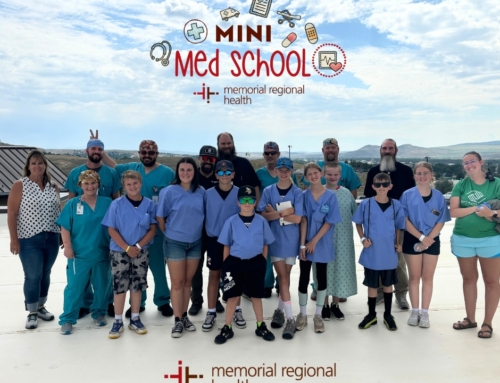You’ve likely heard the saying, “prevention is the best medicine.” It’s lasting, because it’s true! When we are proactive about our health — and take care of our bodies like they are the only ones we’ve got — we tend to live longer and healthier.
“Even before something is wrong, people take their vehicle into the garage to get preventative maintenance done. If they don’t, they risk larger problems down the road. The human body is much the same way and is amazing, so why not take care of it,” said Kelsie Bond, PA-C with Memorial Regional Health’s Rapid Care and Moffat County Clinic.
A good example of how prevention improves outcomes is diabetes. If you catch diabetes in its early stages, as pre-diabetes, you can halt its progression and, sometimes, even reverse it. Think of the diagnoses of pre-diabetes as a wake-up call to take action and correct the issue before it becomes full-blown diabetes. Actions include improving the way you eat, being active, losing weight and quitting smoking.
Preventing type 2 diabetes
People at risk for pre-diabetes are often overweight with a body mass index, or BMI, of 25 or greater. Those who developed gestational diabetes when pregnant, have high blood pressure or are older than age 45 are also at increased risk. If this sounds like you, make a point to attend Memorial Regional Health’s annual community health fair from 8 a.m. to noon April 14. You can get your BMI figured and blood pressure checked. If you did your labs in March, you can get your results from your hemoglobin A1c (HgA1c) test, which gives a three-month average of blood sugar levels.
“Diabetes can lead to a whole host of chronic health issues. The biggest chronic issues can be heart disease, which can lead to heart attack or stroke. Others include vision loss, neuropathy and a weakened immune system. If caught early, treated and monitored, these complications can be significantly reduced,” Bond said.
Preventing heart disease
As with diabetes, the key to preventing heart disease is living a healthy lifestyle that includes a diet rich in fruits, vegetables, whole grains, lean meats and healthy fats, and getting regular exercise. If you don’t know where to start, simply make one healthy change today. Maybe that’s cutting out soda, increasing water intake or making a goal to move every day. At the MRH health fair, you can explore nearly 20 booths on healthy living to spark your motivation. “Being proactive about heart disease is one of the most important health decisions you can make. It can reduce your chance of a heart attack, stroke, congestive heart failure, cardiac arrhythmia and hypertension,” Bond said.
Preventing cancer
With cancer, early detection is key. If you catch it before it metastasizes —s preads to other parts of the body — your chance for full recovery and survival are often high. According to the National Cancer Institute, there is substantial evidence that regular exercise lowers cancer risk, especially when it comes to colon cancer, breast cancer and endometrial cancer. That’s because exercise lowers hormones, reduces inflammation and improves immune system function.
Eating well and avoiding certain foods also helps reduce cancer risk. For example, Harvard Health reports a clear connection between eating processed meat and cancer risk. It also states that eating fruits and vegetables high in antioxidants can reduce cancer risk. Focus on those with bright colors, such as purple, red, orange and dark green.
“Finally, get recommended screens. Early screening and treatment can be significant and can reduce the spread of cancer to other parts of the body,” Bond said.





